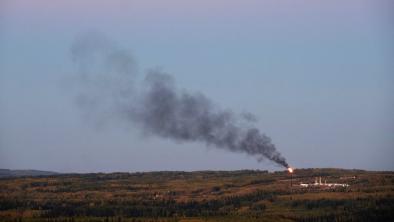Miller Creek IPP operators underperforming
The Question (Whistler/ Pemberton)
Report Epcor working to correct eco-deficiencies, company official says
A new report raising concerns about the environmental management of the Miller Creek micro-hydro project is fuelling renewed debate in the Pemberton Valley about the project and indeed, about the desirability of other independent power projects (IPPs) proposed in the area.
The report, leaked last week to the Western Canada Wilderness Committee (WCWC), takes Edmonton-based Epcor to task on a number of issues. Chief among those are the management of endangered species such as tailed frogs and Harlequin ducks, its reportedly spotty efforts to revegetate slopes in the upper reaches of the creek, its failure to adequately clean up a fuel spill and reported fish kills from an unintentional "dewatering" of the creek last September.
The report, by Port Coquitlam-based TRC Biological Consulting Ltd., states that adherence to either Epcor´s own environmental policies or to B.C. Hydro´s Green Criteria for such plants "are not being demonstrated by the actual project site environmental performance" of the operator of the 33-megawatt facility.
A company spokesperson, though, said the company is working to correct some environmental deficiencies with the project, and is working with the B.C. Ministry of Environment (MOE) to extend environmental monitoring of the project´s impacts beyond the initial five-year period covered in the report. Epcor spokesman Jay Shukin added,
"The report draws attention to some areas where we have to make improvements, no question. But the lack of adherence to the B.C. Hydro Green Criteria, I don´t think is substantiated in the document itself."
The Miller Creek project was the subject of controversy in 2002 and 2003, after Epcor bought the project from the original proponents. Residents had been told the transmission line through the Pemberton Meadows would be suspended on existing poles. After Epcor bought in, the company said it recognized no such commitment and said larger poles were necessary. They were erected, much to some residents´ chagrin.
Allen McEwan, a farmer whose property borders the lower reaches of the creek, said that after reading a media account of the latest report, he found at least two issues on which his experience appears to differ from the report´s findings.
"It seems to me that the negative side of the project has been unnecessarily emphasized," said McEwan, who reported last fall´s dewatering event to provincial authorities. "For example, the dewatering event in September, it states in the paper that there were fish kills, and we were on the stream and there were not fish kills.
"Harlequin ducks - we have a grazing lease up there and we´re in the headwaters quite often. You don´t see Harlequins very often, but we´ve certainly seen them up there," he said, adding that he has seen Harlequins as recently as last year. The report states that except for a lone male, "there were no Harlequin ducks on Miller Creek this year (2007)."
Said McEwan, "I´ll be the first to raise alarms if there´s a problem with Miller Creek, but let´s not exaggerate."
But both Gwen Barlee, WCWC project director, and Pemberton resident Hamish Nichol disagreed with McEwan, saying they think the report points to the need for much more stringent environmental oversight of IPPs than is being provided by MOE.
The B.C. Hydro Green Criteria certification process includes such things as a commitment to no net loss of fish habitat through maintenance of a minimum stream flow and water quality, conservation of endangered species and terrestrial wildlife both upstream and downstream from the operation and maintenance of recreational opportunities in the area.
Barlee said the issues raised in the report strongly suggest the project does not meet a number of the criteria.
"I´m amazed and astounded that Miller Creek would have a Green Criteria certificate from the MOE. It makes me think that the certificate isn´t worth very much," she said.
"It seems like a bit of greenwash - this is a company that is not meeting the commitments made by the company and by B.C. Hydro and the last time I checked, they still had the Green Criteria certificate. "I think (the report) speaks quite critically to the management of the plant and the absolute lack of proper oversight of projects that are coming on line. When you have oil spills that aren´t cleaned up and even a complete dewatering of the creek, what does that say about the commitment to proper management of these projects?"
Both Barlee and Nichol said the problems stem from the B.C. Liberals´ decision in 2001 and 2002 to cut staff at the MOE.
"I´d say that the fiscal greed of these people is such that they need to be scrutinized very closely and that the provincial government doesn´t have enough people to provide the necessary level of scrutiny," Nichol said.
Shukin, though, said the company´s actions - at least partly in response to reported deficiencies - show that Epcor does take its environmental commitments seriously.
"The one important thing to point out is that we´re absolutely committed to making sure that the plant runs in as environmentally sound a way as possible," he said. "As part of that, we are extending the monitoring at the plant. We´re working on terms of reference for the second phase of monitoring, and it´ll be up to the Ministry of Environment how long it runs for."
Timothy Bennett, MOE section head for water allocations, said the company has offered to continue monitoring. MOE officials are awaiting that plan and will work with the company to see that it meets MOE criteria, he said. As well, Bennett said, the Conservation Officer Service is investigating whether fish were killed in last fall´s dewatering event. He said Epcor and B.C. Hydro officials have both taken part in the two meetings to date to determine the actions that are necessary in response to the report.
"Our intention is to continue to meet with Epcor to ensure that actions identified are dealt with in the time frames that have been identified," Bennett said. Shukin admitted some of the company´s efforts to revegetate slopes along the upper reaches of the creek have been unsuccessful.
"We have done seeding in the past, some has been successful and some hasn´t, so we´ll go back and redo some of that work," he said. He added that some culverts that have been identified as being too small are being replaced. Nichol has long raised alarm bells about a much larger - some 140 megawatt - hydro project that is proposed on the nearby Ryan River. He said he thinks the TRC report is further evidence of the need for more oversight from the government. He said he thinks the current government has taken a "gold rush" approach to private power, with little thought given to what´s best for the general public.
Nichol said a power company recently submitted a second water licence application for the lower reaches of the Ryan River. But he opposes any such project - partly because of the environmental degradation and partly because of the potential for a dam or headwall to fail and cause a devastating flood.
"I feel there should be no run of rivers put on any creek or river which jettisons into a flood plain where people live and work," Nichol said.
But Shukin pointed out that some of the issues related to Miller Creek flood control and sedimentation that have been raised have little to do with the power plant and everything to do with downstream removal of gravel and other debris, purely for the purpose of flood control.
McEwan said he agrees with Barlee on at least one count - that the public should have access to the upper reaches of the creek for non-motorized recreational use. He said he has been told the company is working on a "man gate" to allow those on foot to pass through the road gate that´s currently in place. However, McEwan´s view is that in this instance, those with serious issues about IPPs in general are barking up the wrong tree.
"Epcor has made a concerted effort to meet with people who live along the creek, and we´re favourably impressed with their efforts to take care of the creek," he said. "We believe they are very sincere, they´ve reported on the issues that they´re dealing with and have made efforts to deal with the issues in an efficient manner."


